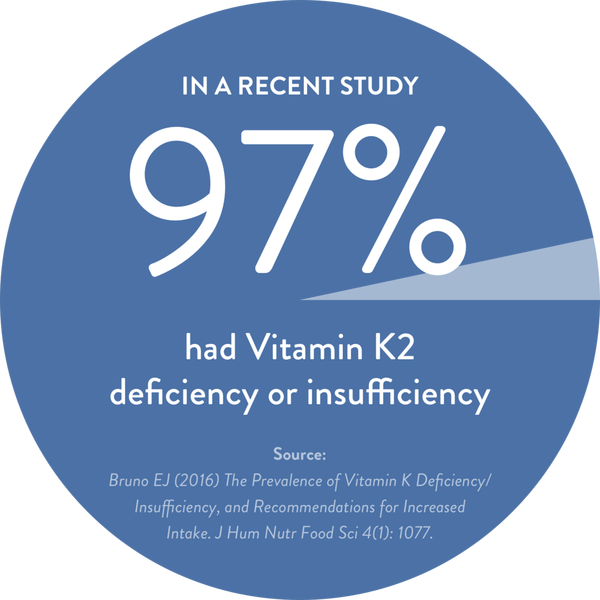Vitamin K is an important nutrient that plays a vital role in blood clotting and bone and heart health. There are two different forms of Vitamin K – K1 and K2.
Many assume that the two derivatives of Vitamin K might have the same functions, however, this is far from the truth as the two forms basically operate like different vitamins altogether due to how they’re used in the body.
Vitamin K1 vs K2
Vitamin K1, or phylloquinone is found in green leafy vegetables such as spinach and some other plant sources like some nuts and fruits. The principle activity of this form of the vitamin is to activate the blood’s clotting factors. This vitamin form actively interferes with the action of the most common blood thinning medication, Warfarin, which is why patients using this drug must carefully watch their intake of foods containing this substance.
Vitamin K2, or menaquinone, is made by bacteria and found in fermented foods such as natural hard aged cheeses and the Japanese specialty natto, a fermented soybean product that is little consumed outside of Japan.
Vitamin K2 can be divided into subtypes, namely, short-chain (i.e., menaquinone-4; MK-4) and long-chain (i.e., MK-7, MK-8, and MK-9). MK-7 is the best absorbed form of vitamin K2. Studies on this form have shown that it plays important roles in bone health, by helping to mobilize calcium into and out of the bones.
Additionally, it has been shown to have an important function in keeping excess calcium out of the arteries, where it may increase the risk of developing coronary calcification. In fact, sufficient Vitamin K2 has been linked to a 54% drop in vascular calcification risk.
Vitamin K deficiency rates
While Vitamin K1 deficiency is more rare due to its abundance in everyday foods, Vitamin K2 deficiency is thought to be quite severe in the global population.

In a 2016 study published by the Journal of Human Nutrition and Dietetics, it was found that 97% of the 452 participants in the study were experiencing Vitamin K2 deficiency or insufficiency.
Getting enough Vitamin K1 & K2
So overall, we know that getting enough Vitamin K1 & K2 is pretty important for good health, but how do we make sure we’re getting enough of these two essential Vitamins?
Well, Vitamin K1 deficiency does have some rather obvious symptoms such as easy bruising and bleeding, however, Vitamin K2 deficiency does not have any obvious symptoms and can be quite costly to test for.
So instead, it is recommended we just practice a good diet of Vitamin K2 rich foods as part of our diets. Fermented food such as natto, tempeh, kombucha are rich vegan friendly sources of K2, while goose liver, cheese, egg yolks, dark chicken meat and butter are great animal-based sources.
Copyright © 2025 Eldon. All Rights Reserved.

Imagine a friend that’s always there, cheering you on in your health journey. That’s Eldon Nutrition! 🌈✨ This series is all about being your daily dose of goodness, a friendly companion that complements your nutritional needs. Whether you’re aiming for wellness goals or seeking a holistic approach to prevention, Eldon Nutrition is here to be your partner in health. 🤗💪

We all have those days – when life throws curveballs, and we could use a little extra support. Enter Eldon DX, our superhero series! 🦸♂✨ Whether it’s aches, pains, or discomfort, Eldon DX has got your back to bring you relief and comfort. It’s like a trusted friend lending a helping hand when you need it most. Eldon DX is here to make your wellness journey a little smoother, one day at a time! 🌟🌪

Beauty meets care in the enchanting world of Eldon! 💅✨ From cosmetics that enhance your glow to medical devices that prioritize your well-being, Eldon is your go-to for a touch of magic in your routine. Because feeling good is an art, and we’ve got the perfect palette! 🌺🎨